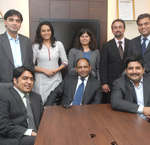
Bijaei Jayarajan – Founding Class
Loylty Rewardz Mngt Pvt Ltd
Chief Executive Officer
Tell us a little bit about your life before the ISB.
It was a period of intense and continuous learning –
not just in academics or management, but general
tough human interaction, continuous opportunity
creation & realisation.
What made you
decide to do a management programme? And what were
your reasons for selecting the ISB?
I
decided to do a management programme because I
though it would be useful, almost essential, to go
through a formal business education programme to
advance my corporate career on a fast track. Why
ISB? Sheer passion to take part in the creation of a
grand and respected b-school in India and also the
illustrious Board of the ISB.
How was the
learning experience at the ISB and from your career?
The learning experience at the ISB was more conceptual
in nature. I didn’t really slog it much, as I should
have, and so ended up listening more, rather than
getting lost in the details of reading 200 pages a day.
Given that I was listening and picking up concepts
mostly (with little CP, phew!), I could identify and
translate some of the learning when I reached the real
corporate world post ISB. Hence, the post ISB career was
the real testing and learning of the concepts I learned
at the school.
What were some of the challenges you faced, both at the
ISB and later in your career?
At the ISB, I came in with little preparation and so
struggled to compete with all those engineers who could
do multiple quadratic equations in their head. The much
needed boot camp to help the less-quantitatively
inclined folks was missing during our time. Post ISB, I
joined a company which did not have a history of hiring
management trainees from premiere b-schools, and so,
given our relatively senior level of entry, there was an
organisation-wide antipathy towards the ‘new ISB
recruits’. It took a year to iron this out and get
properly accepted.
How do you think the ISB has contributed to your
career growth as an entrepreneur?
It probably did not
contribute directly. Given that I went to the Founding
Class, the entrepreneurial gene was already there. But
the ISB gave me the opportunity to grow relatively
faster in the corporate world, pick up and learn
business models in real world faster, and gave me the
courage to take the leap. ISB also helped me get a
network of very close and valuable friends who are
extremely good and were willing to take time out and
play a pivotal role in helping me when I was starting
up, and they continue to help even now.
How did the one year programme at the ISB benefit
your professional and personal life?
The one year programme was one year less, so the pain
lasted for a shorter time and I could get out there
faster.
What is your word of advice to our students who are
thinking about setting up start-ups, who are at the
initial stages of their entrepreneurial ventures?
Firstly, have no fear – absolutely no fear. If you have
even an iota of fear, don’t start-up. Start-ups are very
dynamic. Often things don’t go as you plan. Be extremely
flexible and keep innovating and evolving. Get people
who are much smarter than you to work with you, to be
around you all the time. If you can’t get them to work
with you, then get them to advice you. Hire people who
can deliver the task, not people you like. Finally, have
unbridled passion for what you are doing, not where you
are going. It’s not about the billion dollar valuation
you are chasing, but about the tasks for today, and the
wins you get today, and the highs they give you.
Are there any hobbies or interests outside of work
that you are passionate about?
I used to read, but not much since the start-up. You
give up a lot of things, and hobbies will be one of
them. There really is no time!
What was your experience with the faculty and your
peer group at the ISB?
Most of the faculty was really nice and top class. They
had an approach of wanting to teach good stuff and
wanting to leave behind decent quality understanding,
not just teaching models by rote. My peer group was
outstanding, non-comparable, dynamic, etc.




